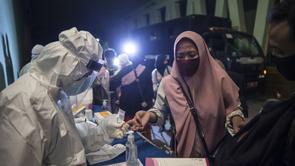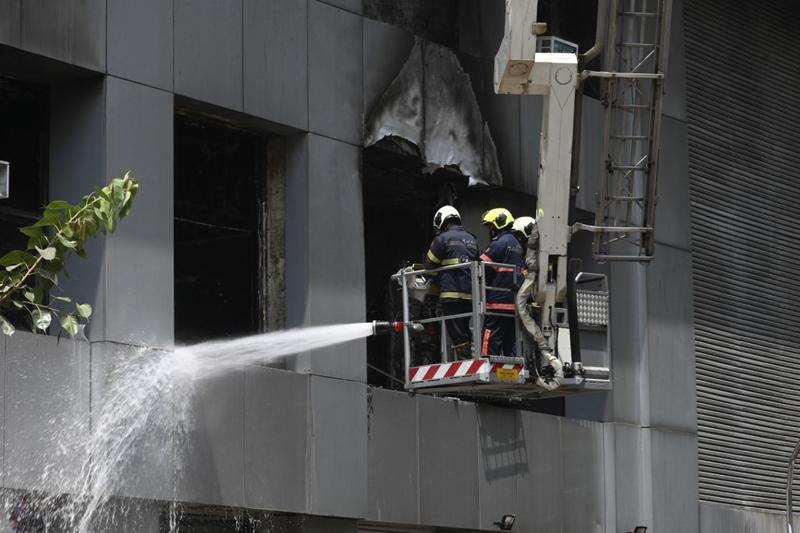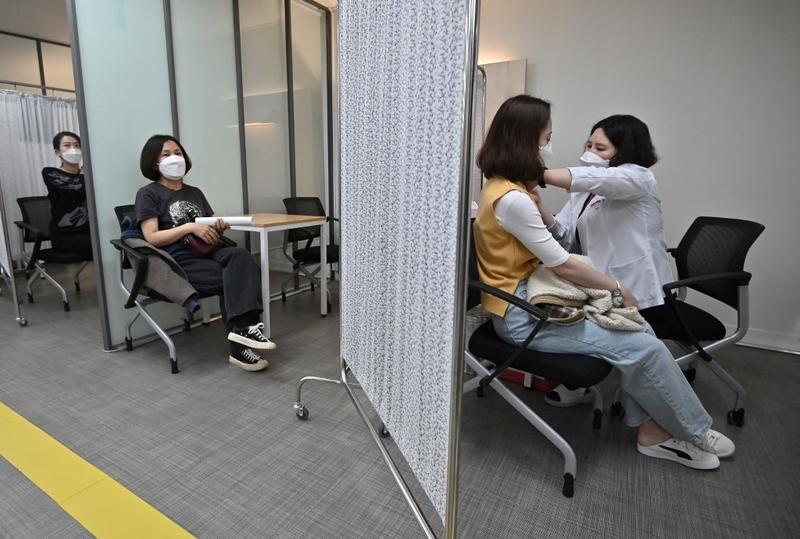 This picture taken on Sept 12, 2020 shows a woman having her blood sample taken to be tested for the COVID-19 coronavirus in Surabaya, East Java, Indonesia. (JUNI KRISWANTO / AFP)
This picture taken on Sept 12, 2020 shows a woman having her blood sample taken to be tested for the COVID-19 coronavirus in Surabaya, East Java, Indonesia. (JUNI KRISWANTO / AFP)
WELLINGTON / SYDNEY / BAGHDAD / JERUSALEM / KUWAIT CITY / BEIRUT / DOHA / SEOUL / BANGKOK / MANILA / ANKARA - Indonesia is in talks with South Korea and Qatar to set up a travel bubble, Coordinating Minister for Investment and Maritime Affairs Luhut Pandjaitan told reporters in a virtual briefing on Friday without giving details. The government is working on a plan to inoculate about 3 million of Bali residents in July.
The Indonesian government has decided not to allow people to go back home during the Eid-al-Fitr holidays this year as the COVID-19 pandemic still drags on, a minister said on Friday.
Coordinating Minister for Human Development and Culture Muhadjir Effendy said this policy applies to all Indonesians, including private employees and informal workers.
The Philippines
The Philippines reported 9,838 coronavirus cases on Friday, the biggest daily jump since the pandemic began, as the World Bank called for vaccinations to be a priority to limit further deaths and support the country’s health system.
Complicating the government’s vaccination drive is the reluctance of most Filipinos to receive vaccines due to safety fears, an opinion poll showed, despite wide-scale worries about contracting the virus.
A recent spike in infections has forced authorities to widen tighter restrictions in the capital Manila to surrounding provinces, but once-a-day religious services with up to 10 percent of a church’s capacity will be allowed in the week ahead of Easter.
The Philippines, which is facing the second worst outbreak of COVID-19 in Southeast Asia after Indonesia, has seen record new cases in three of the past five days, while infections reported in the past 10 days accounted for a tenth of its total 702,856 cases.
Nepal
The Nepali government has removed the requirement for foreign tourists to stay in quarantine provided they have got full doses of a COVID-19 vaccine, Nepal's Ministry of Culture, Tourism and Civil Aviation said.
The ministry said in a notice on Thursday that foreign tourists producing the relevant documents that they have got full doses of vaccine against COVID-19 would not be required to stay in hotel quarantine. Earlier, all foreign tourists visiting Nepal were required to stay in hotel quarantine for at least seven days.
Similarly, the ministry also said that foreign tourists producing documents that were tested negative for coronavirus 72 hours prior to boarding the Nepal-bound plane, are also not required to stay in hotel quarantine. For other tourists who visit Nepal without taking vaccines or who don't have negative Polymerase Test Reaction (PCR) test report against COVID-19, will have to get their swab tested and must stay in hotel quarantine at least until they are tested negative for coronavirus.
Thailand
Thailand will waive quarantine requirements for vaccinated foreign visitors arriving on the resort island of Phuket from July 1, the first key reopening for the tourism-reliant nation.
A panel chaired by Prime Minister Prayuth Chan-Ocha on Friday approved the proposal by Phuket’s private sector and business groups to inoculate at least 70 percent of the island’s residents to prepare for the reopening for vaccinated tourists, according to Tourism Minister Phiphat Ratchakitprakarn.
The government plans to test the reopening plan in Phuket before expanding to other key tourist hotspots including Koh Samui to help restart the tourism industry battered by a year without its millions of tourists, who contributed to one-fifth of the economy before the pandemic.
Thai health officials rushed to calm public fears on Friday after confirming a man had died 10 days after receiving a COVID-19 vaccine earlier this month.
The cause of death was from an abdominal aortic aneurysm (AAA) and rupture, senior health official Sopon Mekton said, adding the country’s vaccination campaign would continue.
The man was inoculated on March 3 and died on March 13.
“I am confident this death is from the aneurysm and not related to the vaccine,” Sopon told a news conference.
Thailand reported 134 new COVID-19 cases on Friday, taking the total caseload to 28,577, according to the Center for COVID-19 Situation Administration (CCSA).
Of the new cases, 128 were domestic infections while six others were imported cases, according to the CCSA.
 In this Feb 21, 2021 photo, a woman receives a dose of the Pfizer/BioNTech COVID-19 vaccine during the first rollout of vaccinations in Australia at the Castle Hill Medical Centre in Sydney. (STEVEN SAPHORE / AFP)
In this Feb 21, 2021 photo, a woman receives a dose of the Pfizer/BioNTech COVID-19 vaccine during the first rollout of vaccinations in Australia at the Castle Hill Medical Centre in Sydney. (STEVEN SAPHORE / AFP)
Australia
Australia is considering diverting COVID-19 inoculations from its vaccination programme to Papua New Guinea (PNG) where the coronavirus is threatening to unleash a humanitarian disaster, a government source said on Friday.
PNG is due to get 588,000 doses of vaccine by June under the COVAX initiative to help poorer countries but doubts have arisen about those supplies given new restrictions imposed in producing countries as the virus spreads.
Australia on Friday reported its first locally acquired coronavirus case in more than a week after a 26-year-old man tested positive, prompting authorities to place restrictions on hospitals, retirement homes and disability centres.
The person who contracted the virus has been infectious for a week but stayed mostly isolated at home since Monday after developing symptoms, Queensland state Premier Annastacia Palaszczuk said.
ALSO READ: Thailand approves Johnson & Johnson one-shot vaccine
 Firemen use water hose through shattered glass of a hospital attempting to douse a blaze that broke out earlier at Dreams mall in Mumbai on March 26, 2021. (INDRANIL MUKHERJEE / AFP)
Firemen use water hose through shattered glass of a hospital attempting to douse a blaze that broke out earlier at Dreams mall in Mumbai on March 26, 2021. (INDRANIL MUKHERJEE / AFP)
India
At least six people died in a fire that engulfed a mall housing a hospital that treated coronavirus patients in Mumbai, authorities said on Friday.
More than 70 patients with COVID-19 infections in the private hospital, on the third floor of the mall, were evacuated to other centers, local civic officials said, adding that the cause of the fire was being investigated.
It was not immediately clear whether any of those killed were COVID patients.
India's COVID-19 tally reached 11,846,652 on Friday as 59,118 new cases were reported across the country, the highest number this year so far, according to the latest figures released by the federal health ministry.
Besides, 257 deaths since Thursday morning were registered, taking the death toll to 160,949.
There are still 421,066 active cases in the country, while 11,264,637 people have been discharged so far from hospitals after medical treatment.
India is restricting coronavirus vaccine exports, a move that will likely hit the world’s most disadvantaged nations hardest and exacerbate what the World Health Organization’s head this week called a “grotesque” supply chasm between rich and poor countries.
The world’s biggest vaccine exporter, the country is a key supplier to Covax, a program backed by WHO and partners to deploy shots to every corner of the globe, and India’s decision to pare back shipments threatens the group’s plans to inoculate 2 billion people before the end of the year.
Iraq
Iraq received 336,000 doses of AstraZeneca’s COVID-19 vaccine on Thursday, the first sent there under the global COVAX vaccine-sharing scheme.
Health minister Hassan al-Tamimi came to Baghdad Airport to greet the life-saving shipment and watched as the cases were unloaded into refrigerated trucks. He said they would quickly go out to regions across the country.
The Iraqi Ministry of Health reported on Thursday 6,513 new coronavirus cases, the highest daily increase since the outbreak of the pandemic, raising the total number of nationwide infections to 815,605.
It also said that 33 new deaths were recorded, raising the death toll from the infectious virus to 14,128, while the total recoveries in Iraq climbed by 4,781 to 732,252.
Israel
Israel's Ministry of Health reported 826 new COVID-19 cases on Thursday, raising the total confirmed tally in the country to 830,761.
The death toll from the virus reached 6,158 with four new fatalities, while the number of patients in serious condition increased from 483 to 484, out of 725 hospitalized patients.
 People commute on a train in Tokyo on March 5, 2021, as officials extended a coronavirus state of emergency in the Tokyo area by a fortnight. (CHARLY TRIBALLEAU / AFP)
People commute on a train in Tokyo on March 5, 2021, as officials extended a coronavirus state of emergency in the Tokyo area by a fortnight. (CHARLY TRIBALLEAU / AFP)
Japan
Iraq received 336,000 doses of AstraZeneca’s COVID-19 vaccine on Thursday, the first sent there under the global COVAX vaccine-sharing scheme.
Health minister Hassan al-Tamimi came to Baghdad Airport to greet the life-saving shipment and watched as the cases were unloaded into refrigerated trucks. He said they would quickly go out to regions across the country.
Kuwait
The Kuwaiti Health Ministry reported on Thursday 1,390 new COVID-19 cases, bringing the total infections in the country to 224,432.
The ministry also announced two more deaths, taking the death toll to 1,258, while the tally of recoveries rose by 1,379 to 208,771. A total of 14,403 coronavirus patients are receiving treatment, including 247 in the intensive care units.
Lebanon
Lebanon registered on Thursday 3,560 new COVID-19 cases, raising the total number of infections to 452,281, the Health Ministry reported.
Meanwhile, death toll from the virus went up by 61 to 5,964.
Mongolia
Mongolia has registered a record high of 437 new locally transmitted COVID-19 cases over the past 24 hours, the country's National Center for Communicable Diseases (NCCD) said Friday.
Of the latest confirmed cases, 370 were detected in Ulan Bator, the country's capital and the hardest-hit city, and the remaining 67 cases were reported in seven provinces, the NCCD said in a statement.
 Spectators gather around the Americas Cup Village prior to the day three races of the 36th America's Cup in Auckland on March 13, 2021. (GILLES MARTIN-RAGET / AFP)
Spectators gather around the Americas Cup Village prior to the day three races of the 36th America's Cup in Auckland on March 13, 2021. (GILLES MARTIN-RAGET / AFP)
New Zealand
New Zealand welcomed 31,870 new citizens in 2020, down from 44,413 in 2019, and the decrease was due to the effects of COVID-19, showed the new data released by the country's Department of Internal Affairs.
Australia is still the most common country of birth for people born outside New Zealand to gain citizenship. Just over 5,200 Aussies became Kiwis in 2020, either because they had a parent who is a citizen or they migrated to New Zealand. The Britain came second, with 5,199 new Kiwis, followed by India with 2,970, according to the data released Thursday.
General Manager Services and Access at the Department of Internal Affairs Julia Wootton said there are various ways people can become citizens. The easiest way is to be born here. Or people can become citizens "by descent" - they have a parent who was born in New Zealand - or "by grant" where they have migrated to New Zealand and applied for citizenship.
"In 2020, we gained 31,870 new foreign-born Kiwis, 11,436 by descent and 20,434 by grant.
"Over the past few years we've seen a decrease in the number of people gaining citizenship by grant, although 2020 saw a significant drop due to COVID-19."
"While we don't collect data on why people do or don't apply to become citizens, we believe that the drop in citizenship numbers is due to the disruption that COVID-19 has caused worldwide. We forecast that this will continue to be the case this year too," said Wootton.
New Zealand reported three cases of COVID-19 in managed isolation and no new community cases on Friday.
The three new imported cases came from India, and have remained in managed isolation and quarantine facilities in Auckland, according to the Ministry of Health.
Qatar
The Qatari Health Ministry on Thursday announced 587 new COVID-19 infections, raising the total confirmed cases in the Gulf state to 175,919.
Meanwhile, 327 more recovered from the virus, bringing the overall recoveries in Qatar to 161,815, while the total fatalities increased by three to 281, according to a ministry statement quoted by the official Qatar News Agency.
 A medical worker receives the second dose of the Pfizer-BioNTech Covid-19 coronavirus vaccine at a vaccination centre in Seoul on March 20, 2021. (JUNG YEON-JE / POOL / AFP)
A medical worker receives the second dose of the Pfizer-BioNTech Covid-19 coronavirus vaccine at a vaccination centre in Seoul on March 20, 2021. (JUNG YEON-JE / POOL / AFP)
South Korea
South Korea said on Friday it will extend its coronavirus distancing rules, which include an outside dining curfew and ban on gatherings of five or more people, for two weeks as its daily new cases hit a one-month high.
The government decides whether to ease or tighten distancing curbs every two weeks, and the current rules have been in place since mid-February.
“The government will maintain the current distancing level and a ban on gatherings of five people or more for two weeks,” Prime Minister Chung Sye-kyun told a meeting.
South Korea reported 494 more cases of COVID-19 as of midnight Thursday compared to 24 hours ago, raising the total number of infections to 100,770.
The daily caseload was up from 430 the previous day, staying above 400 for three straight days.
READ MORE: New double mutant COVID-19 variant found in India
Turkey
Turkey has begun initial talks to procure the Sputnik-V vaccine from Russia, Health Minister Fahrettin Koca said on Thursday, adding Ankara would receive a total of 100 million doses of COVID-19 vaccines from various suppliers by the end of May.
“Initial talks have begun for the procurement of Sputnik-V. This vaccine will be eligible for widespread use following the testing process for its compatibility,” Koca said, adding Ankara was in talks with other vaccine providers.
Turkey on Thursday reported 28,731 new COVID-19 cases, including 1,210 symptomatic patients, as the total number of positive cases in the country reached 3,120,013, according to its health ministry.
The death toll from the virus in Turkey rose by 157 to 30,619, while the total recoveries climbed to 2,900,829 after 19,186 more cases recovered in the last 24 hours.
The rate of pneumonia in COVID-19 patients stands at 4.2 percent and the number of seriously ill patients is 1,790 in the country, said the ministry.
Vietnam
Vietnam’s Health Minister Nguyen Thanh Long said that the nation faces a “high risk” of a new COVID-19 outbreak, according to a post on the ministry’s website. That warning hurt local stocks on Friday. The minister spoke at a conference as authorities searched for passengers who’d shared a flight and a boat ride with two people who crossed the border into the country illegally.


